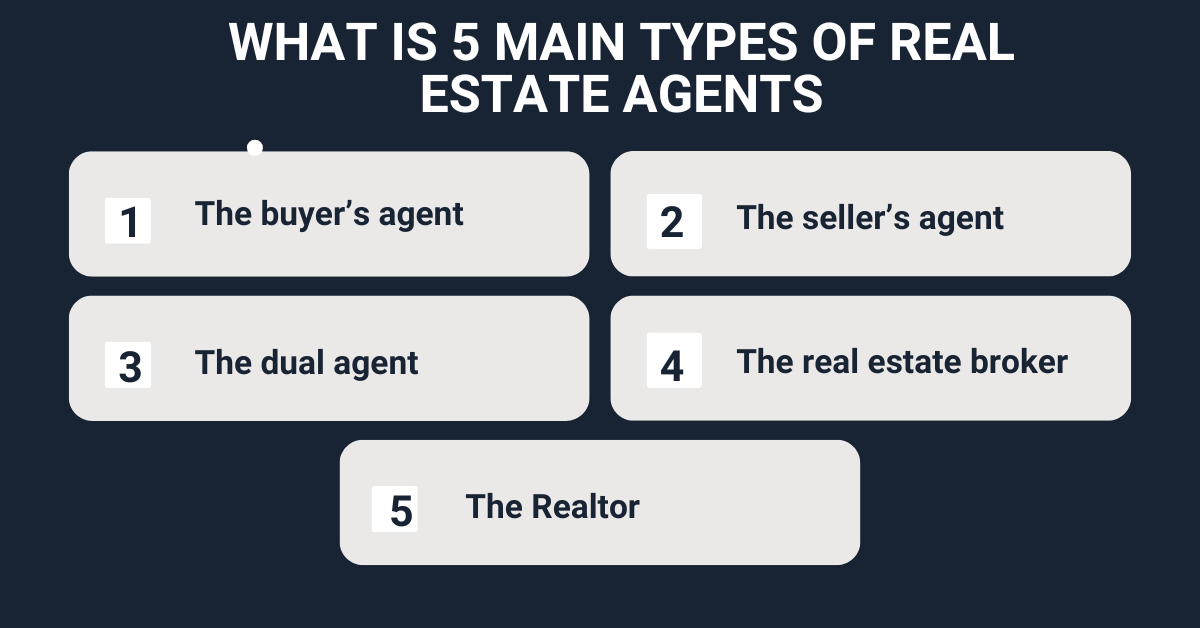Table of Contents
ToggleReal Estate Agents
A licensed professional with knowledge of pricing, negotiating, and market trends, a real estate agent helps customers purchase, sell, or rent properties. By serving as middlemen, agents simplify transactions, making them simpler and more effective for both buyers and sellers. Depending on the interests of the client, they may specialize as either buyer’s or seller’s agents.
Discover the five main types of real estate agents: buyer’s agents, seller’s agents, dual agents, brokers, and Realtor. Find the right expert for your needs.
Here is the list of 5 types of real estate agent:
- The buyer’s agent
- The seller’s agent
- The dual agent
- The real estate broker
- The Realtor

1. The Buyer’s Agent
A buyer’s agent represents the interests of the buyer in real estate transactions. Their role is to guide buyers through the home-buying process, from helping identify suitable properties to negotiating offers and managing paperwork. Buyer’s agents are committed to ensuring their clients get the best deal possible, and they provide insights into property values, neighborhood trends, and future resale potential.
Key Responsibilities
- Conduct property searches and arrange showings.
- Provide expert advice on local market conditions.
- Negotiate offers and contract terms on behalf of the buyer.
- Manage and explain paperwork throughout the transaction.
2. The Seller’s Agent
The seller’s agent, also known as a listing agent, represents the property owner who is selling their home. Their role is to market the property, attract potential buyers, and negotiate offers to achieve the highest possible sale price for their client. Seller’s agents have a deep understanding of pricing strategies, marketing techniques, and staging practices to showcase a property’s best features.
Key Responsibilities
- Price the property accurately and prepare it for sale.
- Develop a marketing plan and conduct property showings.
- Review offers and advise sellers on the best negotiation strategies.
- Manage transaction paperwork to ensure a smooth closing process.
3. The Dual Agent
A dual agent represents both the buyer and the seller in a single transaction. This arrangement is often chosen when both parties agree to have one agent handle the deal. However, dual agency can lead to conflicts of interest since the agent is required to remain neutral and cannot fully advocate for either party.
Key Responsibilities
- Facilitate communication between buyer and seller.
- Ensure transparency in terms of the property’s condition and value.
- Provide unbiased information while remaining impartial.
- Manage paperwork and legal compliance for both parties.
4. The Real Estate Broker
A real estate broker is typically a step above an agent and may work independently or manage a team of agents. Brokers have additional education and licensing requirements, enabling them to handle more complex transactions and supervise other agents. They often take on additional responsibilities such as training new agents and ensuring compliance with state regulations.
Key Responsibilities
- Oversee real estate transactions and ensure legal compliance.
- Supervise and support a team of agents.
- Provide guidance on contracts, negotiations, and transaction issues.
- Help clients navigate complex buying or selling situations.
5. The Realtor
A Realtor is a licensed agent or broker who is a member of the National Association of Realtors (NAR). Being a Realtor means adhering to a strict code of ethics and higher professional standards. While not all agents are Realtors, those who are commit to maintaining integrity, transparency, and trustworthiness in their client interactions.
Key Responsibilities
- Follow NAR’s code of ethics in all transactions.
- Provide high-level professionalism and reliable advice.
- Access exclusive real estate resources and networks.
- Offer knowledgeable insights into local and national market trends.
How to Choose the Right Real Estate Agent
When choosing a real estate agent, consider your specific needs. If you’re buying a property, a dedicated buyer’s agent will best represent your interests. Sellers, on the other hand, would benefit from a seller’s agent with a strong track record in local markets. For those seeking an agent with more experience or a specialty, a Realtor or broker may be the right choice.
Research each candidate, review their certifications and experience, and meet with them to discuss your goals. This process helps ensure that your agent’s skills and approach align with your needs.
Conclusion
Whether you’re a first-time buyer, a seasoned investor, or simply looking to sell your property, understanding the different types of real estate agents can help you navigate the process more effectively. Each type of agent brings a unique skill set to the table, so finding the one that best matches your needs is key to a successful transaction.
FAQs
What’s the difference between a real estate agent and a Realtor?
A Realtor is a licensed agent or broker who is a member of the National Association of Realtors and follows its ethical guidelines.
Can an agent represent both the buyer and seller?
Yes, in a dual agency, an agent can represent both parties, but they must remain neutral to avoid conflicts of interest.
Do brokers have more experience than agents?
Brokers usually have additional training and experience compared to agents and may oversee transactions or manage a team.
Why is it beneficial to work with a buyer’s agent?
A buyer’s agent is focused on helping you find the best property for your needs and negotiating favorable terms, making the buying process smoother.
How can I find a reputable seller’s agent?
Look for agents with a solid track record in your area, check their reviews, and ask for referrals to find a reliable seller’s agent.




